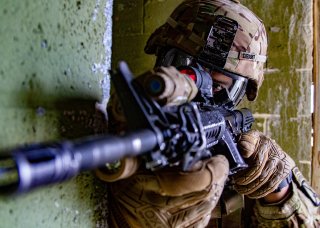Delta Force: Do You Have What It Takes to Join?
"My hands were tingling from the rucksack straps cutting into my shoulders, pinching the nerves and arteries, and restricting the blood flow to my arms.”
The Delta Force, officially known as 1st Special Forces Operational Detachment-Delta (1st SFOD-D), is a U.S. special-missions unit that is primarily focused on counter-terrorism engagements.
Considered a tier-one counter-terrorist unit, it is specifically directed to kill or capture high-value units or dismantle terrorist cells. However, the Delta Force remains extremely flexible in its overall missions—having previously taken part in hostage rescues and covert missions working directly with the Central Intelligence Agency and even offering protective services for high-ranking officials.
Currently, the Delta Force receives its recruits from all across the Army, including many candidates from the Ranger Regiments and Special Forces Groups. To initially qualify, recruits must be enlisted in the Army, be male, have at least four years in service and two and a half years of service left on enlistment, and is within the rank of E4-E8. Keep in mind that there are no civilian-to-Delta enlistment programs available.
To get started, one must attend infantry One Station Unit Training (OSUT), which combines Army Basic Training and Infantry AIT (Advanced Individual Training) in one fourteen-week course. This will give you the fundamental skills to make a successful transition from a civilian into a soldier. If you pass that, then you will attend Airborne Training at Fort Benning. Special Forces troopers who eventually want to join Delta Force must qualify for and complete this particular training.
Next up is the Special Operations Preparation Course (SOPC), which can take four weeks and typically leads up to the Special Forces Assessment and Selection (SFAS) program. The SFAS must be passed before being admitted to Special Forces training.
If the boxes are all checked by now, then you will aim to pass the individual skills phase of training. During this period, soldiers are trained on specialized skills necessary to be successful in any Special Forces engagement. The training period is forty days long and covers land navigation, cross-country map exercise, and small unit tactics.
Taking up another sixty-five days is the Military Operational Specialty (MOS) training phase, which culminates with a mission planning cycle that will put your leadership skills to the test. Your experience, training, and specialty as a soldier will largely dictate what responsibilities you’ll have during MOS.
For the thirty-eight-day Collective Training Phase, soldiers are trained in Special Operations (SO) classes, Direct Action (DA) Isolation, Air Operations, Unconventional Warfare classes, and receive isolation training. This is considered one of the most mentally and physically challenging training one will have to go through in the U.S. military.
To offer some sense of what an individual must overcome to be admitted into the Delta Force, here’s what author Eric Haney had to say about one particular long-distance hike in his book Inside Delta Force.
“I had covered just slightly over thirty miles by now, but still had more than twenty to go. It was getting more and more difficult to do speed computations in my head. My hands were tingling from the rucksack straps cutting into my shoulders, pinching the nerves and arteries, and restricting the blood flow to my arms.”
He continued: “I was bent forward against the weight of the rucksack. It felt like I was dragging a train behind me, and my feet hurt all the way up to my knees. I don’t mean they were just sore, I mean they felt like I had been strapped to the rack and someone had beaten the balls of my feet with a bat. I tried to calculate the foot-pounds of energy my feet had absorbed so far today, but I had to give up the effort. I only knew that the accumulated tonnage of all those thousands of steps was immense. And it was only going to get worse.”
Ethen Kim Lieser is a Minneapolis-based Science and Tech Editor who has held posts at Google, The Korea Herald, Lincoln Journal Star, AsianWeek, and Arirang TV. Follow or contact him on LinkedIn.

